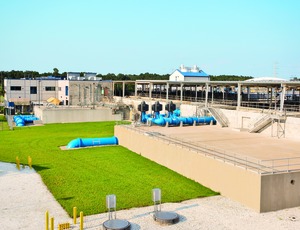
In Florida last year, one of the largest drinking-water projects in the U.S. was completed via a design-build-operate contract and is now operational. However, despite its success, the project apparently has failed to inspire a trend toward an increased use of DBO elsewhere. Nevertheless, an industry expert believes cash-strapped small utilities may soon be forced to privatize their water-facility production and operations.
Veolia Water North America served as construction manager at-risk for a 50-million-gal-per-day expansion of Tampa Bay Water's existing surface water- treatment plant, boosting total capacity to 120 mgd. The $107.9-million final cost was nearly $16 million below the original guaranteed maximum price. TBW officials credit the competitive bidding. Veolia broke the project into three separate bid packages.
The utility's main reason for using DBO was to fill a technology gap. “We'd never done surface water,” says Chuck Carden, director of operations and facilities for the utility. “That was the real reason we went with an outside contractor. We didn't have the expertise.” The contract with Veolia calls for the company to operate the plant until 2023.
There were other benefits to using DBO, especially since Veolia was already operating the existing plant.
“Acceptance testing went smoother than we anticipated—we sailed through that process,” says Mandi Rice, the utility's project manager. “We had a tremendous benefit by having the contract operator be responsible for construction management and operations of the plant.”
Never having gained much traction in the U.S., the use of design-build-operate for water projects has even slipped a bit in recent years, says Steve Maxwell, author of “The Future of Water,” a book published by the American Water Works Association.
“There seems to be a cultural resistance to privatizing water operations here,” says Maxwell, who estimates private delivery of drinking water at roughly 15%. “The business has not grown nearly as fast as many people thought it would.”
Still, Maxwell thinks economic conditions will force the U.S. water industry to use DBO and other privatization strategies more in the future.
“Given the fiscal constraints that most municipalities are under today, the lack of municipal funding options [and] the ever-increasing complexity from a regulatory or technological perspective, a lot of [utilities] are going to be caught between a rock and a hard place,” Maxwell says. “Smaller and more vulnerable utility districts will be increasingly forced into looking into some sort of privatization of various components.”





Post a comment to this article
Report Abusive Comment